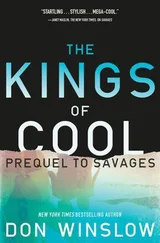Don Winslow - The Power of the Dog
Здесь есть возможность читать онлайн «Don Winslow - The Power of the Dog» весь текст электронной книги совершенно бесплатно (целиком полную версию без сокращений). В некоторых случаях можно слушать аудио, скачать через торрент в формате fb2 и присутствует краткое содержание. Жанр: Триллер, на английском языке. Описание произведения, (предисловие) а так же отзывы посетителей доступны на портале библиотеки ЛибКат.
- Название:The Power of the Dog
- Автор:
- Жанр:
- Год:неизвестен
- ISBN:нет данных
- Рейтинг книги:3 / 5. Голосов: 1
-
Избранное:Добавить в избранное
- Отзывы:
-
Ваша оценка:
- 60
- 1
- 2
- 3
- 4
- 5
The Power of the Dog: краткое содержание, описание и аннотация
Предлагаем к чтению аннотацию, описание, краткое содержание или предисловие (зависит от того, что написал сам автор книги «The Power of the Dog»). Если вы не нашли необходимую информацию о книге — напишите в комментариях, мы постараемся отыскать её.
The Power of the Dog — читать онлайн бесплатно полную книгу (весь текст) целиком
Ниже представлен текст книги, разбитый по страницам. Система сохранения места последней прочитанной страницы, позволяет с удобством читать онлайн бесплатно книгу «The Power of the Dog», без необходимости каждый раз заново искать на чём Вы остановились. Поставьте закладку, и сможете в любой момент перейти на страницу, на которой закончили чтение.
Интервал:
Закладка:
Night after night, Art would lie on the bed in his hotel room, drinking cheap scotch, maybe watching a soccer game or boxing match on TV, pissed off and feeling sorry for himself.
And missing Althie.
God, how he missed Althie.
He had met Althea Patterson on Bruin Walk in his senior year, introducing himself with a lame line: “Aren’t we in the same Poli Sci section?”
Tall, thin and blond, Althea was more angular than curvy; her nose was long and hooked, her mouth a little too wide, and her green eyes set a little too deep to be considered classically pretty, but Althea was beautiful.
And smart-they actually were in the same Poli Sci section, and he’d listened to her talk in class. She argued her viewpoint (a little to the left of Emma Goldman) ferociously, and that turned him on, too.
So they went out for pizza and then they went to her apartment in Westwood. She made espresso and they talked and he found out that she was a rich girl from Santa Barbara, her family Old California Money and her father a very big deal in the state Democratic Party.
To her, he was madly handsome, with that shock of black hair that fell over his forehead, that rugged broken nose that saved him from being a pretty boy, and the quiet intelligence that had brought a kid from the barrio to UCLA. There was something else, too-a loneliness, a vulnerability, a hurt, an edge of anger-that made him irresistible.
They ended up in bed, and in the postcoital darkness he asked, “So, can you cross that off your liberal checklist now?”
“What?”
“Sleeping with a spic.”
She thought about this for a few seconds, then answered, “See, I always thought that spic referred to a Puerto Rican. What I can cross off is sleeping with a beaner.”
“Actually,” he said, “I’m only half a beaner.”
“Well then, Jesus, Art,” she said. “What good are you?”
Althea was the exception to Art’s Doctrine of YOYO, an insidious infiltrator into the self-sufficiency that was already well ingrained in him by the time he met her. Secrecy was already a habit, a protective wall he had carefully constructed around himself as a kid. By the time he fell in love with Althie, he’d had the added advantage of professional instruction in the discipline of mental compartmentalization.
The Company’s talent-spotters had lamped him in his sophomore year, picked him like low-hanging fruit.
His International Relations professor, a Cuban expatriate, took him out for coffee, then started advising him on what classes to take, what languages to study. Professor Osuna brought him home to dinner, taught him which fork to use when, which wine to select with what, even which women to date. (Professor Osuna loved Althea. “She’s perfect for you,” he said. “She gives you sophistication.”)
It was more of a seduction than a recruitment.
Not that Art was hard to seduce.
They have a nose for guys like me, Art thought later. The lost, the lonely, the bicultural misfits with a foot in two worlds and a place in neither. And you were perfect for them-smart, street-tough, ambitious. You looked white but you fought brown. All you needed was the polish, and they gave you that.
Then came the small errands: “Arturo, there’s a Bolivian professor visiting. Could you escort him around the city?” A few more of those, then, “Arturo, what does Dr. Echeverria like to do in his leisure time? Does he drink? Does he like the girls? No? Perhaps the boys?” Then, “Arturo, if Professor Mendez wanted some marijuana, could you get it for him?” “Arturo, could you tell me who our distinguished poet friend is speaking to on the telephone?” “Arturo, this is a listening device. If you could perhaps insinuate it into his room…”
Art did it all without blinking, and did it all well.
They handed him his diploma and a ticket to Langley practically at the same time. Explaining this to Althie was an interesting exercise. “I can sort of tell you, but I can’t really,” was about the best he could manage. She wasn’t stupid; she got it.
“Boxing,” she told him, “is the perfect metaphor for you.”
“What do you mean?”
“The art of keeping things out,” she said. “You’re so skilled at it. Nothing touches you.”
That’s not true, Art thought. You touch me.
They got married a few weeks before he shipped out to Vietnam. He’d write her long, passionate letters that never included anything about what he actually did. He was changed when he got home, she thought; of course he was, why wouldn’t he be? But the insularity that had always been there was intensified. He could suddenly put oceans of emotional distance between them and deny that he was doing it. Then he would revert to being that sweet, intensely affectionate man with whom she had fallen in love.
She was relieved when he said he was thinking about changing jobs. He was enthused about the new DEA; he thought he could really do some good there. She encouraged him to take the job, even though it meant he was going to leave for another three months, even when he came home just long enough to get her pregnant and left again, this time for Mexico.
He wrote her long, passionate letters from Mexico that never included anything about what he actually did. Because I don’t do anything, he wrote her.
Not a goddamn thing except feel sorry for myself.
So get off your ass and do something, she wrote back. Or quit and come home to me. I know Daddy could get you a job on a senator’s staff in no time, just say the word.
Art didn’t say the word.
What he did was get off his ass and go see a saint.
Everyone in Sinaloa knows the legend of Santo Jesus Malverde. He was a bandito, a daring robber, a man of the poor who gave back to the poor, a Sinaloan Robin Hood. His luck ran out in 1909 and the federales hanged him on a gallows just across the street from where his shrine now stands.
The shrine was spontaneous. First some flowers, then a picture, then a small building of rough-hewn planks, put up by the poor at night. Even the police were afraid to tear it down because the legend grew that the soul of Malverde lived in the shrine. That if you came here and prayed, and lit a candle and made a manda-a devotional promise-Jesus Malverde could and would grant favors.
Bring you a good crop, protect you from your enemies, heal your illnesses.
Notes of gratitude detailing the favors that Malverde has bestowed are stuck into the walls: a sick child cured, rent money magically appeared, an arrest evaded, a conviction overturned, a mojado returned safely from El Norte, a murder avoided, a murder avenged.
Art went to the shrine. Figured it was a good place to start. He walked down from his hotel, waited patiently in line with the other pilgrims and finally got inside.
He was used to saints. His mother had faithfully dragged him to Our Lady of Guadalupe in Barrio Logan, where he took catechism classes, made his First Communion, was confirmed. He had prayed to saints, lit candles at the statues of saints, sat as a child and looked at paintings of saints.
Actually, Art was a pretty faithful Catholic even during college. He was a regular communicant in Vietnam at first, but his devotion waned and he stopped going to confession. It was like, Forgive me, Father, for I have sinned, Forgive me, Father, for I have sinned, Forgive me, Father, for I have- Oh, fuck it, what’s the point? Every day I mark men for death, every other week I kill them myself. I’m not going to come in here and tell you that I’m not going to do it again, when it’s on the schedule, regular as Mass.
Sal Scachi, one of the Special Forces guys, used to go to Mass every Sunday he wasn’t out killing people. Art used to marvel how the perceived hypocrisy didn’t faze him. They even talked about it one drunken night, Art and this very Italian guy from New York.
Читать дальшеИнтервал:
Закладка:
Похожие книги на «The Power of the Dog»
Представляем Вашему вниманию похожие книги на «The Power of the Dog» списком для выбора. Мы отобрали схожую по названию и смыслу литературу в надежде предоставить читателям больше вариантов отыскать новые, интересные, ещё непрочитанные произведения.
Обсуждение, отзывы о книге «The Power of the Dog» и просто собственные мнения читателей. Оставьте ваши комментарии, напишите, что Вы думаете о произведении, его смысле или главных героях. Укажите что конкретно понравилось, а что нет, и почему Вы так считаете.












